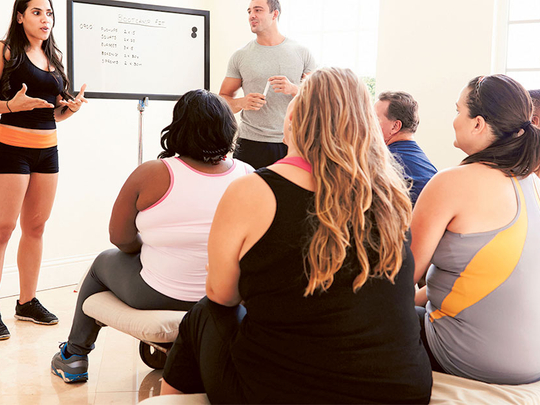
London: Obese women have a 40 per cent higher risk of developing at least seven types of cancer in their lifetime, according to research.
These weight-related cancers include bowel, post-menopausal breast, gallbladder, womb, kidney, pancreatic and oesophageal types.
Statistics released by Cancer Research UK show that obese women have around a one in four risk of developing a cancer linked to weight in their lifetime.
In a group of 1,000 obese women, 274 will be diagnosed with a body weight-linked cancer in their lifetime, compared with 194 women diagnosed in a group of 1,000 healthy weight women.
Approximately a quarter of women are classified as obese and it is estimated that 18,000 women develop cancer as a result of being overweight or obese each year.
There are different ways that obesity could increase the risk of cancer. One possibility is that it is linked to the production of hormones by fat cells — especially oestrogen which is thought to fuel the disease.
Around 12 per cent of postmenopausal breast cancers — a total of 5,269 women — are blamed on obesity. It is the highest number of cases linked to obesity because the cancer is so common.
Last year a study found women were at double the risk of getting the disease because of their weight compared with men.
Researchers said 8.2 per cent of all cancers in women in the UK were caused by being fat. The study found 4.4 per cent of all cancers in men were due to obesity. Previous estimates claimed if Britons continue to pile on the pounds, it will lead to almost 4,000 extra cancer cases a year by 2026.
Dr Julie Sharp of Cancer Research UK said: “Losing weight isn’t easy, but you don’t have to join a gym and run miles every day or give up your favourite food. Just making small changes that you can maintain in the long term can have a real impact.
“We know that our cancer risk depends on a combination of our genes, our environment and other aspects of our lives, many of which we can control — helping people understand how they can reduce their risk of developing cancer in the first place remains crucial in tackling the disease.
“Lifestyle changes — like not smoking, keeping a healthy weight, and cutting back on alcohol — are the big opportunities for us all to reduce our cancer risk. Making these changes is not a guarantee against cancer, but it stacks the odds in our favour.” Breast cancer patients can raise their chances of survival by exercising, a study has found. Tumours grew more slowly when mice being treated for cancer had an exercise wheel in their cage. It means that in future, breast cancer patients could be prescribed exercise as part of their treatment.
As cancers grow, the blood vessels supplying them with oxygen become thin and tangled, making it harder for drugs to reach the tumour. But when US researchers from the Duke Cancer Institute in North Carolina let mice with breast cancer run on wheels, their bloody supply improved. Researcher Dr Mark Dewhirst said: “We were truly amazed by these findings.”











